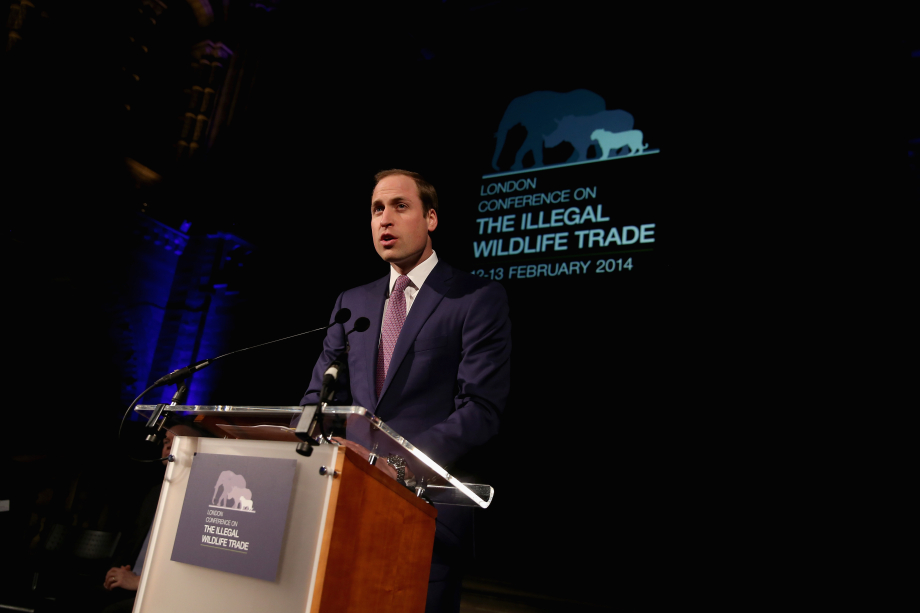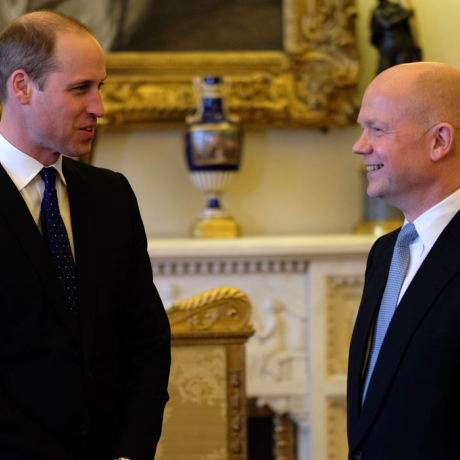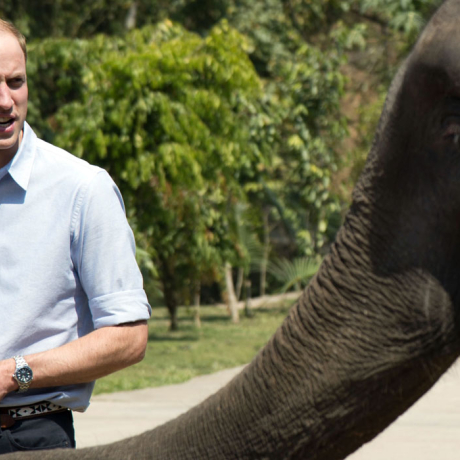The Duke's desire to help protect some of the world's most endangered animals at risk from this trade is a genuine reflection of his values. He is aware that failing to tackle the illegal wildlife trade and allowing animals such as elephant and rhino to go extinct will be a major blow to our collective confidence to confront any global challenge.
In 2013, His Royal Highness convened United for Wildlife, uniting the world's leading wildlife and conservation charities with the common purpose of protecting some of the world's most iconic species. United for Wildlife provides a collaborative, global approach to tackling the illegal wildlife trade on a number of fronts; from providing better on-site protection for wildlife, to helping reduce the demand for illegal wildlife products in other parts of the world. It is also working with law enforcement agencies and the private sector to close down the trafficking routes transporting these products between killing field and market place. Importantly, the collaboration is also working to engage young people around the world with conservation issues.
At the root of the illegal wildlife trade, for example, is the demand for products that require the deaths of tens of thousands of these animals every year, pushing them further towards extinction. We must work together to prevent this catastrophe and allow our children the opportunity to experience wildlife in its many beautiful and varied forms
The Duke of Cambridge
The Duke has led United for Wildlife's work in each of these sectors, often raising the issue on a global level. During a visit to the United States in 2014, His Royal Highness attended a conference at the World Bank in Washington during which he delivered a speech highlighting the link between corruption, and natural resource crime and illicit financial flows. Addressing an audience of experts, policy makers, anti-corruption agents and private companies, The Duke described the illegal wildlife trade as "one of the most insidious forms of corruption and criminality in the world today."

He added that illegal wildlife crime goes far beyond being just a threat to endangered species, but also effects on our society, economy and security: "It recognises neither national borders nor national interests. It distorts economic development, undermines the rule of law and exacerbates sources of conflict" he added.
While in Washington, The Duke raised this issue with President Obama at the White House. A few months later, The Duke enjoyed the opportunity to talk to President Xi of China about the immediacy of the illegal wildlife trade during a visit to Beijing in March 2015.
His Royal Highness has also overseen a Taskforce set up under the auspices of United for Wildlife to look at the role of the transport industry within the illegal wildlife trade and examine how the sector can break the chain between suppliers and consumers. The Taskforce, chaired by former Foreign Secretary William Hague, brings together key partners from the transport sector.
The Duke is acutely aware that ending the illegal wildlife trade of animal parts will require a generational shift of opinion in many places around the world. He knows it is a test of his generation's ability to solve the world's much more complex global challenges it will face in the decades to come.
That is why he was delighted to have the opportunity to talk about this topic to a young audience on CCTV1, the most-watched television station in China.
During his speech on the programme "Let's Talk", The Duke said: "In the 33 years since I was born we have lost around 70 percent of Africa's elephant population. Of those that are left, 20,000 are being killed every year – that is 54 elephants killed every single day. At this rate, children born this year – like my daughter Charlotte – will see the last wild elephants and rhinos die before their 25th birthdays."
He continued: "We have to accept the truth that consumers are driving the demand for animal body parts, for art, for trinkets, for medicine. Only we as consumers can put the wildlife traffickers out of business, by ending our demand for their products."
In March 2016, The Duke unveiled an ambitious, transport industry-led Declaration developed by the transport sector to crack down on illegal wildlife trafficking routes.
In addition to his support of United for Wildlife, The Duke is also Patron of Tusk, a charity which works to protect Africa's unique natural heritage. The Duke of Cambridge and Prince Harry launched the Tusk Conservation Awards in 2013, and in 2015 The Duke instigated a new Wildlife Ranger Award, recognising the perilous work of those on the conservation frontline.
In September 2016 The Duke of Cambridge gave the keynote address at Time For Change, a multi-city event organised by Tusk on the eve of the Convention for International Trade in Endangered Species (CITES). Speaking from The Shard in London, and connected via satellite link-up to speakers in Tokyo and Johannesburg, The Duke urged all to renew their energy in the fight against the illegal wildlife trade: "Ladies and gentlemen, I am not prepared to be part of a generation that lets these iconic species disappear from the wild. I am not prepared to explain to our children why we lost this battle when we had the tools to win it – and I know that none of you in Tokyo, Johannesburg or here in London want this either."
We can win this battle. And in doing so we can take a small, but very important step in reminding ourselves that we are capable of rising to the challenges of our age – a message that our young people need to hear loud and clear.
The Duke of Cambridge, at the Third International Conference on the Illegal Wildlife Trade, Hanoi, Vietnam
The Duke visited Hanoi, Vietnam, in November 2016 to attend the Third Conference on the Illegal Wildlife Trade, and to bring a positive message to the people of Vietnam about their ability save iconic animals for future generations. While in Hanoi, The Duke spoke with traditional medical practitioners about their work to curb the use of Illegal Wildlife Trade products, and also met with children from a local school.
Through his United for Wildlife consortium, and his Patronage of Tusk, The Duke of Cambridge will continue to raise awareness of the devastating effects of wildlife crime and encourage a concerted global response against the poachers and traffickers who are plundering the world's natural heritage and are responsible for the slaughter of tens of thousands of animals a year.




